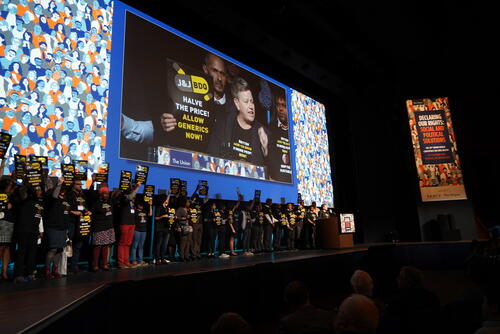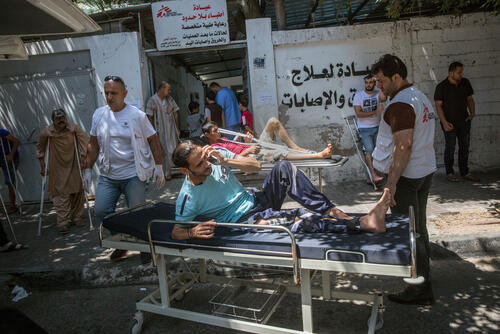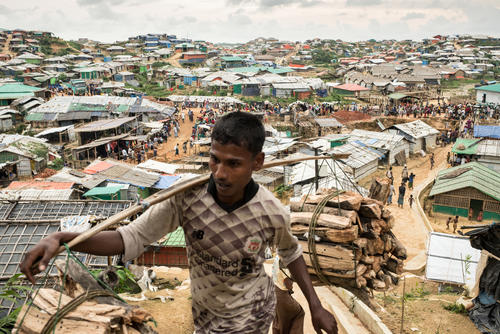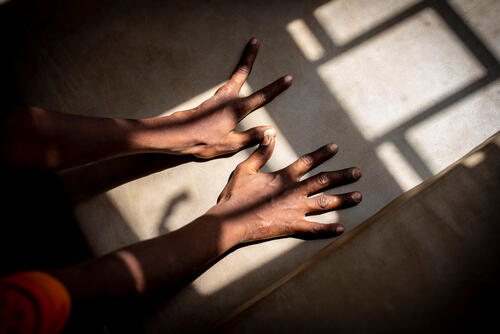Although believed by many to be a disease of the past, tuberculosis (TB) kills more people today than any other infectious disease and is one of the top 10 causes of mortality worldwide.
An estimated 1.6 million people die from TB each year, equivalent to a staggering 4,400 lives lost every day.
World leaders have set ambitious goals to combat the disease, but the international response to this global crisis is shamefully off track.
Drug-resistant TB (DR-TB) – caused by bacteria that do not respond to standard TB treatment – is a particularly worrying and growing problem in many of the places Médecins Sans Frontières (MSF) works. Until very recently, globally recommended treatment options available to people with DR-TB took up to two years to complete and included up to 14,600 pills and painful daily injections that caused devastating side effects, such as deafness and psychosis.
On top of that, the cure rates were very poor for multidrug-resistant TB (MDR-TB) and extensively drug-resistant TB (XDR-TB), strains of the disease that fail to respond to even greater numbers of drugs. Today, newer treatment options exist that could stop senseless deaths from these forms of TB, but far too few people are receiving them.
After losing her mother to MDR-TB five years ago, Ankita Parab learned that she too was infected with the disease. Following two years of arduous treatment, she was declared cured. Later, her brother also fell ill with MDR-TB.
In 2016, when her brother’s condition worsened, his doctor referred him to MSF’s TB clinic in Mumbai, India, where he was quickly started on a treatment regimen that included the newer TB drugs. Ankita was also tested for TB through contact tracing, one of the preventive services MSF offers to all family members living with people with TB. The results were a terrible shock for her. Despite her earlier treatment, Ankita had developed XDR-TB – the most severe form of the disease.
Although our team in Mumbai started both siblings on the newer treatment at the same time, tragically, Ankita’s brother’s illness was too advanced and he died soon after. Her brother’s death and her new diagnosis were a double blow for Ankita. She remembers thinking, “He started his treatment at the same place, so if this can happen to him, it can happen to me as well – I’m not special. He took care of himself better than I ever did.”
It can be extremely difficult for people to complete long, toxic DR-TB treatment regimens without consistent encouragement and support, particularly when faced with personal hardships like the loss of a family member, unemployment or social exclusion due to other people’s fear of the disease. Comprehensive psychosocial support – including help to address mental health issues such as anxiety and depression – is a cornerstone of MSF TB treatment programmes worldwide.
With support from her family, friends and MSF medical staff and counsellors, Ankita completed her two years of XDR-TB treatment with MSF in May 2018 and was declared cured. Follow-up testing in November confirmed there was no relapse or recurrence of TB.
Key to Ankita’s successful treatment was the use of one of the newer drugs that significantly improve DR-TB cure rates and cause far fewer side effects. However, these medicines – bedaquiline and delamanid – remain inaccessible to the vast majority of people eligible to receive them. In 2018, MSF medical teams and the MSF Access Campaign intensified work to overcome this deadly access impasse through both clinical research and targeted advocacy.

One barrier to improving care is rooted in the fact that a combination of medicines is required to form effective DR-TB treatment regimens. But pharmaceutical corporations developed bedaquiline and delamanid in isolation and did not study the safety and efficacy of the drugs in combination with existing medicines. This prevailing model of research and development causes missed opportunities and undue delays in getting better treatment options to people.
To improve the chances of survival for people in our care, MSF is conducting crucial research together with partner organisations to develop the evidence base for the therapeutic value of newer DR-TB treatments. These trials will not conclude until 2022; however, based on data from drug safety monitoring and operational research in clinical settings, the World Health Organization announced new DR-TB treatment recommendations in 2018 that include the use of the newer drug bedaquiline.
While the pharmaceutical corporation Johnson & Johnson (J&J) holds patents on bedaquiline, it is only one contributor to the broad, collective effort that has enabled development of the drug and demonstration of its therapeutic value. Support has also come from public and philanthropic funding and a TB community desperate to provide improved treatment options for people with DR-TB.
When bedaquiline was first authorised for use in 2012, it was the first DR-TB drug to be developed in more than 40 years. But by late 2018, only 28,700 people had received it worldwide – less than 20 per cent of those who could have benefited from it.
Based on this alarming unmet medical need and J&J’s unwarranted monopoly control over bedaquiline access and pricing, MSF spoke out unapologetically in 2018 to urge the company to take swift action to ensure affordable access to the drug for everyone who needs it to survive.
Highlighting the joint effort that has established bedaquiline’s clinical value, and analysis that shows it can be manufactured and sold profitably for as little as 25 US cents per day, we called on J&J to allow the production of more affordable generic versions of the drug and drop its price for bedaquiline to no more than US$1 per day.
In October, MSF joined with other civil society organisations to interrupt the opening ceremony of the 49th Union World Conference on Lung Health in The Hague in order to reiterate these calls. And ahead of the first-ever United Nations High-Level Meeting on Tuberculosis in September, we called on world leaders to translate their ambitious commitments to address TB into bold, genuine action to save lives, including scaling up existing medicines and diagnostic tests, and developing and delivering faster, safer, simpler tools for tomorrow.
As we continue to strive to provide the best possible TB treatment for people in our care, we will also maintain our pressure on governments and pharmaceutical companies to live up to their commitments to reduce suffering and death from this terrible disease.
MSF provided TB treatment to 19,400 patients in 2018, including 2,840 patients with MDR-TB. The MSF Access Campaign was launched in 1999 to push for access to, and the development of, lifesaving medicines, diagnostic tests and vaccines for people in MSF’s care and beyond.















